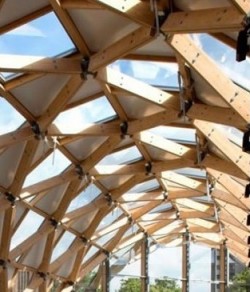The Structural Timber Association (STA) hosted a roundtable discussion at The Houses of Parliament on the future of housebuilding and in particular, the potential of structural timber and offsite construction building methods.
Attended by industry leaders and representatives from The Housing Forum, Zero Carbon Hub and Wood for Good, along with MP David Warburton, the discussions produced an optimistic and positive outlook toward industry growth and development.
Hosted by Honorable David Warburton MP, the discussion followed a tour of the Houses of Parliament, where attendees learnt the history of the building and the UK Government.
Based around three key areas of discussion – the recent changes in Government regulations and its impact on provision of affordable housing, implications of the postponement of the Zero Carbon Homes target and the opportunity and benefits of offsite construction, each conversation led to placing the consumer at the forefront of the timber housebuilding industry.
“Following the recent changes announced by the Government surrounding providing affordable housing, the opportunity to build more, better homes is clear and well-known within the timber frame industry. However, the benefits of using timber frame needs to be communicated not only to developers and contractors but also consumers,” explains Andrew Carpenter, Chief Executive of the Structural Timber Association.
“The energy efficiency and sustainability of a home is not currently a priority, or for some even a consideration, when purchasing a new home. And so, in the same way efficiency has now become and important factor when it comes to purchasing a car, we need to instil this into the house buying process too.
Following the postponement of the Zero Carbon Homes target, disappointment was felt across the housebuilding industry. The discussion, therefore, focused around the need for a new target and aim to drive forward the desire for energy efficient homes.
Due to the current shortage of affordable homes, it was agreed that any drive toward educating consumers and developers on building better homes should come from the Government. This would then enable the construction industry to communicate benefits of timber and offsite building methods to the wider market.
“Offsite construction has taken off within the self-build market as a quick and cost-effective way of building a home. However to enable the method to gain a significant market share, other sectors including mainstream residential developments should be considered.” Andrew adds.
“A large area for development is retrofit, where significant energy efficiency increases can be made, bringing older buildings up to date with modern day standards. This was recently demonstrated in a pilot project in Thamesmead, where high performance prefabricated timber façade panels were used to over-clad the existing concrete building. This resulted in significantly improving the building’s insulation and each building only taking a week to complete.”
Making use of the skilled professionals already within an industry with a severe skills shortage, offsite construction allows the skills within the industry to go further.
Concluding, Andrew said, “Both timber frame and offsite construction present the housebuilding sector with the speed of build, energy efficiency and ease of erection needed to meet the Government housebuilding targets.
“To ensure as a sector we grow to meet this demand, we need to educate developers, contractors and consumers of the benefits of modern alternatives to brick and block construction.”
Original link - specificationonline.co.uk
STA takes the timber debate to the Houses of Parliament
9th February, 2016









